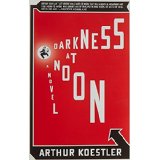‘The revolution always devours its own’
Rubashov, a former leader of the communist revolution, finds himself on trial when the new regime moves to consolidate its power. The ideals held by the first wave of revolutionaries are now perceived, not only as outmoded, but as an existential threat to the very revolution they risked their lives to bring about. Like others of the former vanguard, Rubashov finds himself the target of a fearful communist leadership which deploys a new wave of revolutionaries, unrestrained by any contradiction between the ideals of the revolution and the scurrilous means necessary to put it into practice, to discredit the old guard in the public’s eye. Only by openly admitting the regime’s false charges of counter-revolutionary activities and begging for forgiveness will Rubashov and his old colleagues be allowed any place in the new regime. They are thus forced into an agonizing choice between remaining true to themselves or publicly recanting their long-held ideals. If they choose the former, they will be eliminated, i.e., put to death. This reversal of fortune from hero to traitor lays bare the perverse internal contradictions in communist theory whenever one attempts to put it into practice.
Rubashov, a former leader of the communist revolution, finds himself on trial when the new regime moves to consolidate its power. The ideals held by the first wave of revolutionaries are now perceived, not only as outmoded, but as an existential threat to the very revolution they risked their lives to bring about. Like others of the former vanguard, Rubashov finds himself the target of a fearful communist leadership which deploys a new wave of revolutionaries, unrestrained by any contradiction between the ideals of the revolution and the scurrilous means necessary to put it into practice, to discredit the old guard in the public’s eye. Only by openly admitting the regime’s false charges of counter-revolutionary activities and begging for forgiveness will Rubashov and his old colleagues be allowed any place in the new regime. They are thus forced into an agonizing choice between remaining true to themselves or publicly recanting their long-held ideals. If they choose the former, they will be eliminated, i.e., put to death. This reversal of fortune from hero to traitor lays bare the perverse internal contradictions in communist theory whenever one attempts to put it into practice.

Hollywood Traitors: Blacklisted Screenwriters – Agents of Stalin, Allies of Hitler by Allan H. Ryskind (2015)
Available on Amazon
Reviewed by Klara Sever
Available on Amazon
Reviewed by Klara Sever
Longtime "Human Events" editor Allan Ryskind grew up in Hollywood. He was the son of Marx Brothers screenwriter Morrie Ryskind who knew the "Hollywood Ten" - the writers and directors who were fired after refusing to testify before the House Un-American Activities Committee (HUAC). Allan Ryskind’s well-researched and documented Hollywood Traitors deconstructs the Left’s fairy tale version of the “Hollywood Ten” with the cold, hard facts in the historical record, while at the same time keeping readers highly engaged. Along the way, you will meet famous, beloved actors like Humphrey Bogart, his wife Lauren Bacall, and Ronald Reagan; writers Lillian Hellman and Clifford Odets; directors Elia Kazan and other Hollywood notables. Ryskind smartly weaves in the story of the Communist Party USA (CPUSA) which never wised up to Stalin's manipulation and brutality, acting in essence as the agent of a foreign power. Ryskind deftly describes how then-president of the Screen Actors Guild (SAG) Ronald Reagan saw through and countered the devious tactics of John Howard Lawson and other Communist labor organizers. Hollywood Traitors is a fascinating read with the added benefit of such little pearls as the admission, finally, that Communism is a religion, as Phil Dunne wrote in the Washington Post. Well, as you know: it is not polite to talk about someone’s religion.
